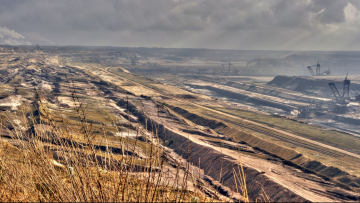RWE's reputation on the line with 1.5 billion euro stake in Bulgarian nuclear plant
Albena Simeonova: + 359 888215268
Heffa Schücking: + 49 160-96761436
Jan Haverkamp: + 420 603-569243
Albena Simeonova: + 359 888215268
Heffa Schücking: + 49 160-96761436
Jan Haverkamp: + 420 603-569243
Environmental campaigners have warned of the reputational risks in store for German energy giant RWE following the announcement that it has been chosen as strategic investor for the Belene nuclear power plant (NPP) in Bulgaria. Belene NPP is situated in a zone of high seismic activity in the north of Bulgaria, close to the Romanian border. It is slated to become the first new build of a Russian design NPP within the European Union.
Belene would be RWE's first investment into an NPP outside Germany. The total project costs are estimated at EUR 7 billion. [1] For a 49 percent stake in the project, RWE has offered to provide EUR 1.275 billion in equity and a loan of around EUR 280 million Euro. Before the contract can be signed, however, RWE's supervisory board must give its approval.
Heffa Schücking, of German environmental organisation urgewald, said: "For RWE there are many risks attached to this investment and one of them is the impact it will have on the company's reputation in Germany. The use of Russian reactor technology at the new Belene NPP and the siting of the plant in an earthquake zone have already provoked strong misgivings among municipal and union representatives on RWE's supervisory board. According to German standards, this project would never receive an operating license. We therefore call on RWE's supervisory board to say 'No' to this controversial investment."
Environmental organisations across Europe consider Belene to be one of the most dangerous nuclear projects currently on the drawing board in Europe. In 1977, a large earthquake took place in the region and some 120 people died only 14 kilometres from the planned NPP site. [2]
Albena Simeonova, from the Bulgarian NGO coalition BelenNE (No to Belene), said:"The plan to build a nuclear power plant in Belene goes back to the early 1980s. In 1983, however, even Soviet scientists warned that this location is not suitable for an NPP. RWE and the Bulgarian government are playing Russian roulette with the health and safety of millions of people."
Jan Haverkamp, Greenpeace campaigner for Eastern Europe, seconded these concerns: "Up to now RWE has only operated NPPs in its home market. In Bulgaria, however, there is a poor safety culture and Bulgaria has repeatedly been warned by the EU because of corruption cases. Only a few weeks
ago, NEK, the majority shareholder in Belene, announced that Bulgarian companies would be awarded contracts without a public tender. Such an environment opens the door to corruption and makes it difficult to guarantee high-quality safety standards."
One of the most prominent critics to have warned RWE against the project is Dr. Georgui Kastchiev, the former head of the Bulgarian Nuclear Safety Authority. [3] According to Dr. Kastchiev: "The Belene project poses intolerable safety and environmental risks. The lack of operational experience with the planned reactor type and the lack of qualified personnel and effective controls will undoubtedly lead to a poor quality of construction works. If one factors in the high seismic risks of the location and the low level of the nuclear safety culture in Bulgaria, it can only lead to one conclusion: this project must not go forward."
Heffa Schücking concluded: "It will be interesting to see how NEK and RWE plan to raise the more than EUR 5 billion still needed to achieve financial closure for Belene. To date, more than a dozen banks have declined financing and NGOs throughout Europe are determined to campaign against any financial institution that becomes involved with this project."
Notes for editors:
1. While EUR 4 billion is often quoted as the Belene NPP's total costs, this figure refers only to the contract with Atomstroyexport and does not include all construction costs such as turbines, infrastructure, project preparation, waste storage and the first fuel load. The estimated total costs are EUR 7 billion as cited in: "Economic Minister pessimistic on Belene nuclear power plant funding", Sofia Echo, 8.7.2008.
2. Construction of the Belene nuclear power station started in 1985. The project was halted in 1991, and finally dropped in 1992 due to its environmental and economic risks. In 2003, however, the Bulgarian government restarted the project and in 2006 it decided to build two completely new reactors at the Belene site. The tender for construction was won by a consortium of the Russian firm Atomstroyexport and the French / German Areva NP to build an AES-92 nuclear power station with two VVER 1000/466B reactors. This is a first of a kind reactor that has no operational record elsewhere in the world.
3. Dr. Gueorgui Kastchiev was one of the top managers of the Koszloduj nuclear power station from 1972 to 1989, and was head of the Bulgarian Nuclear Safety Authority from 1997 to 2001. He currently holds a position as Senior Nuclear Physicist at the Institute of Risk Research in Vienna.

